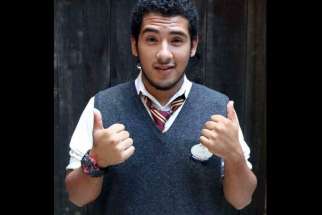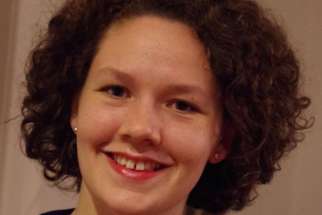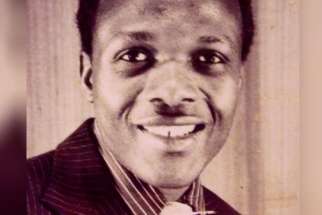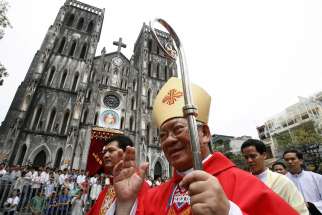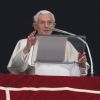ORLANDO, Fla. – As a youth minister, Michelle Murphy has established strong bonds with many of her youths, especially the ones she met during her first year working at All Souls parish in Sanford. She lovingly refers to them as her "cornerstone youths."
A lesson on the Universal Church
PHOTO GALLERY: On a trip to Europe, YSN correspondent Erin Jamieson felt a connection with Catholics around the world professing the same faith.
This photo gallery is an example of what Digital Edition subscribers have access to. The Digital Edition features the same articles as the print edition PLUS colour photos, videos, audio clips and links. If you are not a subscriber, you can try a free subscription by going here:http://www.catholicregister.org/digitaledition
This past month, I was fortunate enough to travel around Europe for three weeks. I spent time in Berlin, Milan, Venice, Paris and Barcelona. I came home with great pictures, and even greater stories. From amazing feats of architecture, to historical sights, to everyday street life, I had the opportunity to sample the diverse palate Europe has to offer.
Benedict Daswa African martyr
One of the dynamics of last year’s Synod on the Family was the contrast between the German-speaking bishops, who have been preoccupied with finding a way for those in invalid marriages to receive Holy Communion since Joseph Ratzinger and Walter Kasper were young theologians, and the African bishops. The latter, not to put too fine a point on it, objected that it was not possible for the Church to teach that simultaneous polygamy was immoral for poor black Catholics in Africa while serial polygamy was okay for rich, white Catholics in Europe.
A worldly Church
Tonga, Myanmar, Cape Verde — the countries read like answers from a geography quiz. They may not be the easiest places to find on a map, but these small nations will soon be represented in Rome when Pope Francis welcomes 15 new voting-eligible cardinals into the Church.
Truly universal Church
When Pius XII became Pope in 1939 the college of cardinals had token representation from Latin and North America, one cardinal from the Middle East and none from the rest of Asia or from Africa. It was 89 per cent European.
By the time Pius died in 1958, the college had welcomed cardinals from Africa, India and China, Latin American representation had tripled and European membership was just 64 per cent of the total. The internationalization of the Vatican had begun.
But the journey has been slow since then even though European Catholics as a percentage of the worldwide Church have been in steady decline, if not outright free fall. So it was welcomed news last month when Pope Benedict announced a “little-consistory” for Nov. 24 to create six new cardinals who come from six non-European countries.
In doing so, history of sorts is being made. This is the first consistory in a thousand years of cardinal making in which Europe and North America are outnumbered by new cardinals from the developing world. In addition to one American, red hats are going to bishops from Lebanon, India, Nigeria, Colombia and the Philippines. Together they reflect the changing face of a Church in which two-thirds (and growing) of its members live in Africa, Asia and Latin America.
The Church continues to evolve. Announcing the consistory last month, Pope Benedict called it recognition that “the Church belongs to all peoples, speaks all languages.” In a reference to Europe, he said the consistory confirms “it is not the Church of one continent but a universal Church.”
Last February, the Pope added 18 new elector cardinals at a consistory that raised eyebrows for being European-heavy, naming just three new cardinals from the developing world. Africa, despite having the world’s fastest growing Catholic population, was completely shut out. Adding five non-Westerners now doesn’t even things out but it puts a welcomed dent in the imbalance and foreshadows the future.
The newest cardinals are relatively young. Two are in their 50s, the oldest is 73 and the average age is 63. In addition to helping select future popes, they will sit on various Vatican committees and exert influence for many years to come.
Also, these additions bring the college to its full complement of 120 electors for a new pope, and lowers European votes to 51 per cent of the total. That’s not much different from when Benedict became Pope in 2005. What continues to change, however, is the demography of the world’s one billion Catholics. The Church is projected to be 75 per cent non-Western within the lifetime of many of the new cardinals.
How that impacts the Church will be watched closely, particularly so for the papacy, an institution that has been mostly Italian and always European for the last 12 centuries.
Health is universal good to be defended, not commoditized, says pope
VATICAN CITY - Good health is a benefit that needs to be defended and guaranteed for all people, not just for those who can afford it, Pope Benedict XVI told hundreds of health care workers.
The new evangelization is needed in the health field, especially during the current economic crisis "that is cutting resources for safeguarding health," he said Nov. 17, addressing participants at a conference sponsored by the Pontifical Council for Health Care Ministry.
Hospitals and other facilities "must rethink their particular role in order to avoid having health become a simple 'commodity,' subordinate to the laws of the market, and, therefore, a good reserved to a few, rather than a universal good to be guaranteed and defended," he said.
Nearly 600 people who work in the field of health care attended the council's Nov. 15-17 international conference, which focused on the theme: "The Hospital, Setting for Evangelization: A Human and Spiritual Mission."
The pope told them that, on the one hand, advancements in science and medicine have led to greater possibilities for curing the physical ailments of those who are ill.
"But on the other hand, it seems to have weakened the ability to care for the whole and unique person who suffers," he added.
Such advancements, the pope said, seem "to cloud the ethical horizons of medical science, which risks forgetting that its vocation is serving every person and the whole person, in its different phases of existence" from conception to its natural end.
It is important that the Christian concepts of "compassion, solidarity, sharing, self-denial, generosity and giving oneself" become part of the vocabulary of all people involved in the world of health care, he said.
"Only when the wellbeing of the person, in its most fragile and defenseless condition and in search of meaning in the unfathomable mystery of pain, is very clearly at the center of medical and assisted care" can the hospital be seen as a place where healing isn't a job, but a mission, the pope said.
Bringing life-giving and evangelizing assistance to others will always be expected of Catholic health workers, he said.
"Now more than ever our society needs 'good Samaritans' with a generous heart and arms open to all," he added.
Being Catholic brings with it a greater responsibility to society, and Catholics need to live their lives with courage as a true vocation, he said.
Professionals and volunteers working in health care represent "a unique vocation, which necessitates study, sensitivity and experience," he said. However, it's also necessary to go beyond academic qualifications and develop a true capacity to respond to the mystery of suffering and see one's work as a human and spiritual mission, he said.
Faith has a lot to teach about the mystery and value -- or "science" -- of suffering, and Catholic health workers "are qualified experts" in this field, the pope said.
"Your being Catholic, without fear, gives you a greater responsibility in the realm of society and the church," Pope Benedict said. "It's a real vocation" that was lived in an exemplary way by many saints including St. Gianna Beretta Molla and servant of God Jerome Lejeune, the French Catholic geneticist.


